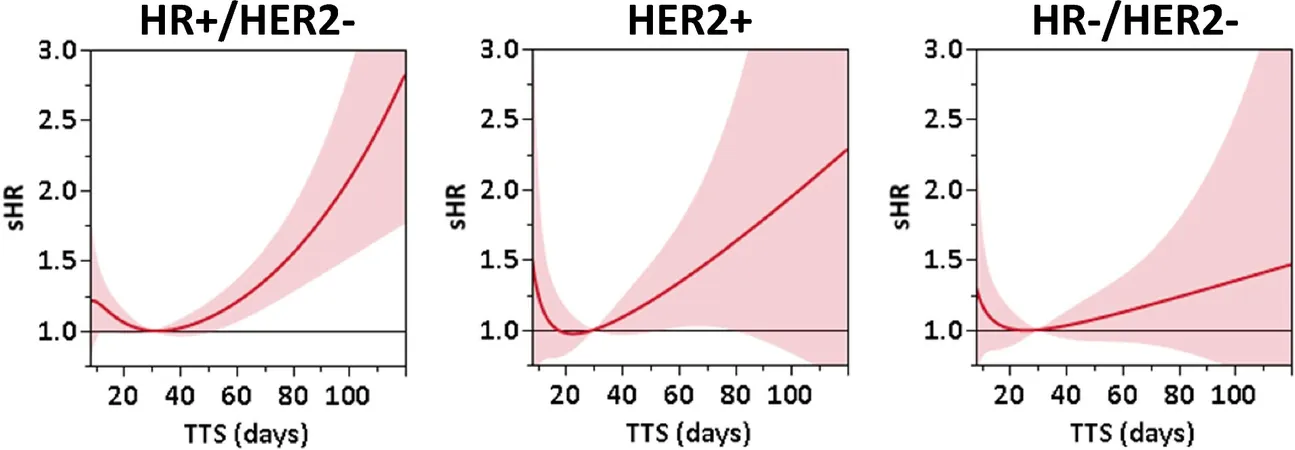
New Research Reveals Alarming Risks of Delayed Breast Cancer Surgery Beyond 42 Days
2025-03-24
Author: Li
Introduction
A ground-breaking study from the University of Oklahoma has unveiled that patients diagnosed with specific subtypes of breast cancer are at a significantly higher risk of death if they endure a delay of more than 42 days before undergoing surgery. This alarming revelation underscores the critical importance of timely intervention for effective cancer treatment.
Key Findings
The research team unexpectedly found that the subtypes most vulnerable to surgery delays were actually those traditionally considered to have a favorable prognosis. These include hormone receptor-positive breast cancers, which rely on hormones like estrogen or progesterone for growth, and HER2-negative cancers, known for exhibiting lower aggression levels due to decreased HER2 protein levels.
While these cancers typically grow more slowly, the study indicated that delays in surgical treatment resulted in a staggering increase in mortality risk. Specifically, after 42 days post-diagnosis without surgery, the risk of death from breast cancer increased substantially. By 60 days, patients' mortality risk surged by 21%, escalating to 79% at the 90-day mark, and ultimately reaching a shocking 183% increase in risk at 120 days.
Aggressive Subtypes
Strikingly, hormone receptor-negative and “triple negative” breast cancer subtypes—known for their aggressive nature—remained relatively unaffected by surgical delays, exhibiting minimal changes in outcomes.
Expert Insights
“This critical finding points out that 42 days can pass in the blink of an eye, yet it can have severe repercussions,” warned lead author Dr. Takemi Tanaka, a pathology professor at the OU College of Medicine. “Recent trends indicate that not only are surgical delays becoming more frequent, but they are also extending in duration.”
Factors Contributing to Delays
There are several factors at play when it comes to delayed surgeries. The process of diagnosis and preoperative planning can extend over several days. Patients may also find themselves hindered by professional or familial responsibilities, seek a second opinion, or explore options for egg preservation to ensure future reproductive choices post-chemotherapy—all of which are valid considerations, according to Dr. Tanaka.
Recommendations and Next Steps
Notably, the Commission on Cancer had advised that most women with breast cancer undergo surgery within 60 days—a crucial step yet acknowledged as insufficient for some patients who may require more urgent treatment.
Why these particular subtypes of breast cancer face heightened risks due to treatment delays is still under investigation. One theory suggests that their slower growth rate provides an opportunity for potential tumor evolution. Another posits that the inflammatory response elicited by biopsies may unintentionally promote tumor progression. In prior research, Tanaka demonstrated that nonsteroidal anti-inflammatory drugs could help limit inflammation in mouse models after biopsies, suggesting a possible avenue for reducing risk.
Historical Context
Previous studies corroborate the dangers of treatment delays, revealing a 6% to 8% increase in mortality risk for every four-week postponement across various solid tumors. However, Tanaka's study is pioneering in its focused examination of differential risks across breast cancer subtypes, striving to establish clearer connections to death specifically from breast cancer.
This new investigation also builds on her earlier work, which indicated that patients with hormone receptor-positive breast cancer who had surgeries delayed into the 61 to 90-day interval saw an 18% higher likelihood of tumor upstaging compared to those treated within the first 30 days. Alarmingly, the risk surged by 47% for those who underwent surgery beyond the 90-day threshold.
Data and Future Research
In undertaking this study, data was sourced from the National Cancer Institute's Surveillance, Epidemiology, and End Results (SEER)-Medicare-linked database, offering a more comprehensive representation of the patient population than previous analyses.
Dr. Tanaka emphasized the need for ongoing research and has announced plans to launch a clinical trial at the OU Health Sciences campus in Oklahoma City. This initiative aims to further elucidate how treatment delays directly correlate with increased mortality risks in breast cancer patients, potentially reshaping treatment timelines and improving outcomes for women facing this daunting diagnosis.
Conclusion
Don't let time slip away—understand the true risks of delaying breast cancer surgery before it's too late!

 Brasil (PT)
Brasil (PT)
 Canada (EN)
Canada (EN)
 Chile (ES)
Chile (ES)
 Česko (CS)
Česko (CS)
 대한민국 (KO)
대한민국 (KO)
 España (ES)
España (ES)
 France (FR)
France (FR)
 Hong Kong (EN)
Hong Kong (EN)
 Italia (IT)
Italia (IT)
 日本 (JA)
日本 (JA)
 Magyarország (HU)
Magyarország (HU)
 Norge (NO)
Norge (NO)
 Polska (PL)
Polska (PL)
 Schweiz (DE)
Schweiz (DE)
 Singapore (EN)
Singapore (EN)
 Sverige (SV)
Sverige (SV)
 Suomi (FI)
Suomi (FI)
 Türkiye (TR)
Türkiye (TR)
 الإمارات العربية المتحدة (AR)
الإمارات العربية المتحدة (AR)